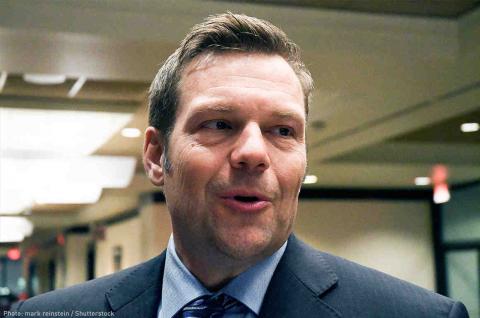If You Care About the Right to Vote, Here Are Six Things You Need to Know About Kris Kobach
On May 11, President Trump formed a commission on “election integrity” to investigate voter fraud and voter suppression in the United States. The executive order follows repeated, unsubstantiated claims from the president that millions of people voted illegally in the 2016 presidential election.
There are immediate red flags that the public needs to be aware of: namely the complete lack of evidence that would justify this use of taxpayer resources and the record of the official tapped to lead it.
Kris Kobach, Kansas secretary of state and vice-chair of the Presidential Advisory Committee on Election Integrity is a known voter suppressor. He has been brought to court — and lost — several times for suppressing the constitutional rights of citizens to vote in Kansas.
Voting is the cornerstone of our democracy and the fundamental right upon which all our civil liberties rest. Americans deserve a champion who will fight to protect and expand voting rights, not suppress them. Kris Kobach is not that person and here are the top reasons why:
- Kris Kobach believes that President Trump won the popular vote, once you subtract “three to five million illegal votes” cast in the 2016 presidential election. This theory, first pushed out by President Trump and then parroted by Kobach, does not hold water. Academic and legal experts, election administrators and officials, and even leaders of the Republican Party have all rejected this claim.
- Kris Kobach has wreaked havoc on voting rights in Kansas.
In September 2016, the U.S. Court of Appeals for the 10th Circuit, in a unanimous opinion by Judge Jerome Holmes, an appointee of George W. Bush, found that Kobach had engaged in “mass denial of a fundamental right” by blocking 18,000 motor voter applicants from registering to vote in Kansas. The ACLU’s Voting Rights Project has sued him four times, and Kobach lost all four cases in 2016.
- Kris Kobach says that there are lots of non-citizens voting. He just can’t produce any evidence. But don’t just take our word for it, hear it from the courts:
- In May 2017, U.S. District Judge Julie Robinson, appointed by George W. Bush, found that Kobach had “scant evidence of noncitizen voter fraud.”
- In October 2016, the U.S. Court of Appeals for the 10th Circuit described Kobach’s theory of Kansas’ widespread problem of noncitizens voting as “pure speculation.”
- In September 2016, the U.S. Court of Appeals for the D.C. Circuit said that Kobach had “precious little record evidence” of noncitizen voting.
- Kobach is the chief architect of the Interstate Voter Registration Crosscheck program, a notoriously flawed system which Kobach admits generates “a significant number” of “false positives” when trying to find people registered to vote in more than one state. A recent study found that Crosscheck “would eliminate about 200 registrations used to cast legitimate votes for every one registration used to cast a double vote.” And according to The Washington Post, Kobach “examined 84 million votes cast in 22 states to look for duplicate registrants. In the end 14 cases were referred for prosecution, representing 0.00000017 percent of the votes cast.”
- Kobach has a secret voter suppression plan. He showed it to Donald Trump but doesn’t want the public to see it. Last November, Kobach was notoriously photographed carrying documents into a meeting with then-President-Elect Trump, which appeared to contain a proposal to change the federal motor-voter law. The ACLU sought those documents in connection with litigation against Kobach over his office’s violations of the motor-voter law, but Kobach’s lawyers denied they even existed.
In April 2017, U.S. Magistrate James O’Hara blasted Kobach for engaging in “word-play meant to present a materially inaccurate picture of the documents,” and ordered Kobach to turn them over. The ACLU has now received those documents, but Kobach continues to claim that they are “confidential” and cannot be shared with the media or the general public.
- Kris Kobach isn’t just a threat to voting rights.
- Kobach co-authored S.B. 1070, Arizona’s infamous racial profiling law from 2010, which required local law enforcement to demand the papers of anyone they suspected of being in the country illegally. The law prompted a nationwide outcry and economic boycott, and the ACLU fought it in the courts for years. The Supreme Court and the lower courts either blocked or drastically limited all of its major provisions. The anti-immigrant bill gave rise to several copycat bills in other states, including Alabama’s HB56 — which Kobach also helped to draft. The ACLU and allies defeated those laws in the courts as well, exposing the fact that Kobach’s legislation was built on a foundation of legal error.
- In 2010, Kobach assisted in drafting a bill, designed to end the constitutional guarantee of birthright citizenship for any child born in the United States. That bill was too extreme to gain any traction even among the legislatures that had adopted Kobach’s reprehensible racial profiling laws.
- Kobach serves as counsel to the Immigration Law Reform Institute, the legal arm of the Federation for American Immigration Reform, which the Southern Poverty Law Center has listed as a hate group since 2007. SPLC has written extensively about Kobach’s role in advancing a nativist agenda.
- In 2012, Kobach compared homosexuality to drug abuse and polygamy. During his failed 2004 congressional campaign, he accused LGBTQ+-rights groups like the Human Rights Campaign of promoting “homosexual pedophilia.”


Spread the word